Whosoever killeth a human being for other than murder or corruption on the earth, it shall be as if he had killed all mankind, and whosoever saveth the life of one, it shall be as if he had saved the life of all mankind.
The Koran.
The term classicist applied to Alan Treloar is far too narrow. As Master of Wright College, he had an astonishing gift for languages and a profound understanding of the way they function and develop. He would admit, when pressed, to direct knowledge of about 80. He had a formidable command of many, such as Sanskrit, Russian, Chinese, Arabic and Hittite.
His first linguistic interests were in French at six and Latin at 10. He soon took up ancient Greek as well and was learning Japanese by correspondence while at school. He made a huge impression on me – partly because of his kind, reserved nature. He could be observed showing interest in everything anyone said and always with a smile playing on his lips as if he was truly content. Why wouldn’t he have been?
Listening to him speak about the origins, links, unusual features and other details of so many languages – especially those with origins in the Middle East – was fascinating. In the Common Room company of Russel Ward, I called upon him to translate a letter I had received in Arabic.
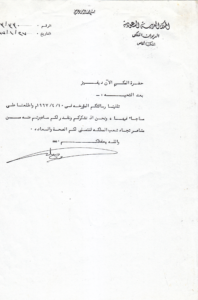
He translated it as follows:
‘To The Honourable Mr. Davis,
We received your letter dated January 27,1967 on the 10th April and have read its contents. We are very grateful and appreciate your feelings towards our people. We wish you health and happiness.
May Allah bless you.
King Faisal, The Kingdom of Saudi Arabia.
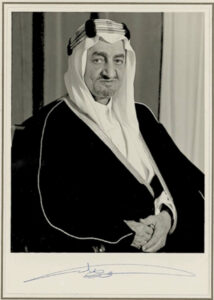
‘How did you address him?’
‘Your Highness’.
‘Not ‘Brother Faisal’. That’s how el-Hajj Malik el-Shabazz would have during his audience.’
‘Yes, but only in replying to this form of greeting. The king in waiting would have been the one who initiated this familiar form of address. He was formally recognizing the former self named Malcolm X, his designated state guest, as a member of his brethren.
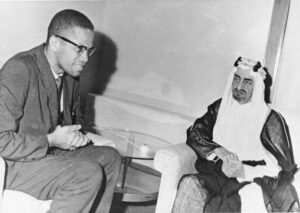
‘How did you greet him?’
‘Salaam alaykum,’ I replied, ‘ – peace be upon you’.
‘What did you say to him?
‘I thanked him for his support for the Palestinians and bringing slavery in the Kingdom to an end.’
‘How difficult was this to abolish?’
‘It was never as central to life in Arabia as it was in the American Deep South. Less than one percent of the population were slaves and their owners were compensated while at the same time gaining employees. Thus it was easier to do away with.’
‘Easier than with wage slavery. What were they used for?’
‘Almost all worked as domestic servants, rather than field hands.’
‘They were therefore what Malcolm X referred to as “house negroes” rather than “field negroes”.’
‘What was the difference according to Malcolm?’
‘Malcom characterized the house negro as having a better life than the field negro. Hence he was more unwilling to leave the plantation. Malcolm sees him as potentially more likely to support existing power structures.’
‘Those that favour whites over blacks. He saw him as an Uncle Tom.’
‘One and the same. Malcolm X identifies with the field Negro.’
‘He did soften this attitude didn’t he.’
‘Malcolm’s trip to Arabia proved life altering. He met what he said were “blonde-haired, blued-eyed men I could call my brothers”. Like Paul Robeson in the Soviet Union, he didn’t witness racism in his host country. He returned to the United States with a new outlook on integration. This time, instead of just preaching to African-Americans, he had a message for all races.’
‘Human beings should live in harmony. They should never be fettered like horses.’
‘Yes, there’s lots of other ways, aren’t there?’ I said.
‘Faisal knows the difference more than most. He’s a rider and lover of horses, you know.’

‘A passion he shares with our Queen, as well as a bit of son, lumiere et fumée. I saw them both via newsreel last month riding her carriage in Hyde Park.
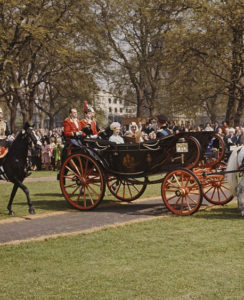
They were there to review the military pageant by the King’s Troop Royal Horse Artillery.’
‘You would have enjoyed that display of precision firepower, I daresay.’
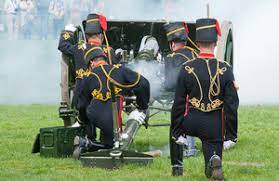
‘Wild horses couldn’t have kept me away,’ replied Mr. Treloar. Those immaculate ceremonial uniforms, those proud soldiers and seventy one horses pulling 13-pounder, First World War field guns. All that heavy booming, shaking the leaves off trees.’
‘One of those troopers came off his horse.

It seems he was pushing the horse to go faster.’
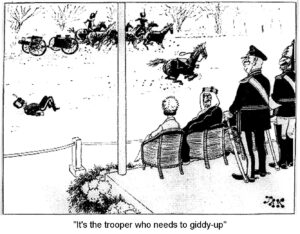
‘What do you imagine the King and Queen were talking about?’
‘It may have been about their families and their mutual love of horses. It may have been about the menu on the Queen’s long awaited visit to Saudi Arabia. She may have expressed some reservations about the prospect of being offered sheep’s eyes.’
‘It’s considered an honour there. However I‘d be a bit put off too,’ said Russel. ‘When l’m stared at l tend to lose my appetite.’
It may have been about the pressures of public life,’ I continued. ‘Faisal may well have said to the Queen, ‘Don’t you ever feel you’d like to get away from all this and be raced off into the sunset?’
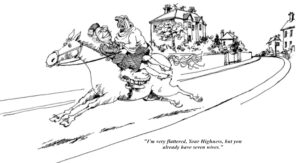
‘It would have been about more than horses,’said Mr. Treloar. ‘It may have been about how an absolute monarch, the only person who can legislate, publish laws, treaties and concessions, can reinvent himself as a constitutional figurehead.
‘It definitely would have been about the strategic meetings being held on this state visit, said Russel. ‘Both parties wished to avoid a repetition of the severing of diplomatic relations as occurred during the Suez crisis. An integrated working relationship between the House of Saud and the House of Windsor was being cemented.’
‘Trowelled on, I believe.’
‘There were all kinds of weighty considerations. The King brought a rather glittering gift for Queen Elizabeth to the palace : a diamond necklace set in platinum—’
‘Such a romantic setting.’
‘—with a combined weight of more than 80 carats of diamonds.’
‘On her humble flat it would help pay the rental. A kiss on the hand may be quite continental but as we know diamonds are a girl’s best friend.’
‘The piece is set with more than 300 diamonds, including baguettes, brilliants, and eleven pear-shaped diamonds set as pendant stones.’
‘The wearer would always be thinking about food wouldn’t they,’ I said. ‘Not that these two royals would ever have any shortage .’
‘They have a common identity of concerns,’ said Alan Treloar. ‘They’re worried more by national energy shortages than personal ones. Both are preoccupied thinking of light sweet crude. Their kingdoms are very vulnerable to stoppages in the continuous flow. Britain, a vulnerable ‘consuming’ nation depends on the goodwill of the Arabs with ever more money to burn. Like all industrialized capitalist nations, it sees the survival of its economy as dependent on being guaranteed continued access to the largest single deposit of strategic raw material in the world.
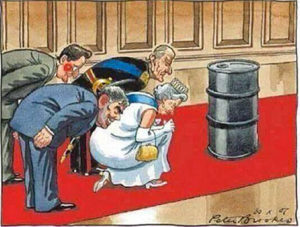
Thinking of necklaces, look on the kingdom as a vast one with pipelines strung together, the kingdom’s empty heart and bristling coastal cities sitting above the most valuable oil-bearing strata on earth.
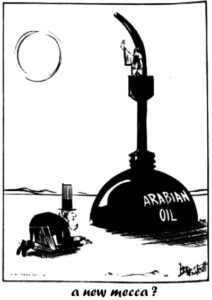
For this reason alone Britain will continue to have close relations with this anomalous state for many years.’
‘What has Britain got to offer the Arab sheiks?’
‘It has many commercial agreements with Saudi Arabia. Schools, hospitals, airports all have to be built. There is money to be made there. Britain even profits from protecting it’s investments through arms deals.
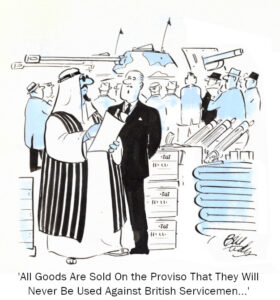
The British Empire may be all but gone, but the role of Britain in counter-revolution and counter-insurgency throughout the world is still a considerable one.’

‘Making the world safe for capitalism,’ said Russel.
‘And the Saudis. What’s in it for them?’
‘The regime depends for it’s continuance on the material needs of the advanced industrial countries. Through his minister Sheikh Yamani, Faisal is seeking to maximise its position within the global market. This way it will receive greater autonomy and military and political support.’
‘This rule depends on violence, political calculation and foreign backing’, said Russel. ‘It’s security apparatus, full of police, spies and tribal paramilitaries, is efficient and ferocious against any potential opposition. There’s no legal opposition, no trade unions, no elections, no press and religious freedom, no constitution.’
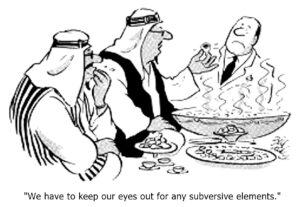
‘You believe the kingdom’s government is intolerant of free speech,’ I said.
‘Especially anything that challenges political authority. Strikes and work stoppages are banned. Muffled reports about arrests and torture trickle out of the closed country’s fiercely guarded borders, watched over by early-warning aircraft. Faisal imposed martial law at the height of pro-Nasserite agitation. ‘Order’ is maintained by beheadings and floggings. Women can exist in purdah, veiled and highly restricted in their activities.
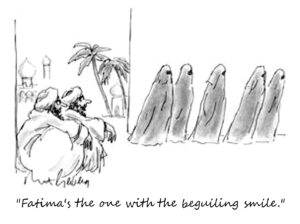
They are discouraged from even driving cars, from travelling without the say-so of a male guardian. How do you feel about the kingdom’s people now? ’
‘I’m shocked to hear all that,’ I said. ‘How can the government repress it’s own people so?’
‘The regime has a great strategic advantage. It’s able to isolate dispersed population centres while moving its forces rapidly from place to place. It disperses and divides the armed forces themselves, constantly purging them. Meanwhile half the country, the pastoralists, sharecroppers and nomadic population are kept mystified, in ignorance and encouraged to remain trapped in their traditional universe. Who needs television?!’
‘Any ruler in this harsh unforgiving land has to have an iron fist,’ said Mr. Treloar. ‘It’s a dangerous neighbourhood. Loyalty is as elusive as the shifting sands. He has be tough as a falcon holding together the alliances the family has forged between the disparate, fractious tribes’. ‘and with the Wahhabis .’
‘‘Wahhabis?’I asked.
‘This salafist sect dominates the religious establishment. It’s religious gatekeepers legitimise the ruling family’s temporal authority, and, despite the constant tensions between them, underpin it’s dynastic power. It is based on a long standing bargain with the salafiin, the conservative religiose men with long beards and short thaub, the Arab dress.’
‘What do they get out of the bargain from this reflexive loyalty?’
‘It gives themselves the opportunity to cleanse Islam of all it’s ‘deviant’ beliefs and accoutrements and to impose a very literal interpretation of the text.’
‘It sounds like they need to breeze up their lives .’

Who’s going to dare show them how ? They are highly intolerant of those who don’t agree with them. They try to enforce their fiercely puritanical, obscurantist vision of an Islamic society. ’
‘Along with the coercive mechanisms the state can provide’, said Russel.
‘So, this is a symbiotic relationship where both are in each others’ pockets,’ I said. ‘Doesn’t this restrain any liberal moves however faint by the government?’
‘The official religious scholars have themselves developed a noteworthy political pragmatism. This is so even when decisions from the state conflict with it’s theologically based convictions.’
‘So from what quarters do the less quietist oppositional tendencies we hear about come from?’
‘From the younger, lower ranking radical elements.’
‘You pointed out to me, Russel, a generation gap means a struggle between aging conservatives and their young and restless critics.’
‘In Saudi Arabia, an opposite kind of battle is being waged. The idea that you have to go to the young for progress is turned on its head. It’s the older generation of Saudis, including the royals, who are more friendly to progress, and to the West. Fundamentalism is a belief embraced more by the young.’
‘They are less likely to act in accordance with the wishes of the royal family?’
‘These activists as they see themselves demand an uncompromising enforcement of the salafist code of conduct as established during the eighteenth century. They incite and preach intolerance and exclusion. They declare that Islam is going wrong because the Saudi Arabian leadership has been prepared to work with the West. These literalist, imitative fundamentalists try constantly to dictate the agenda.’
‘And what is theirs?’
‘They aim to purge society in a permanent holy war. They want to get rid of what they see as its corrupting ungodly influences such as worshipping shrines and idols. Drinking alcohol is not halal and is illegal.’
‘So any would be tipplers have to rely on sly grog. What about ungodly infidels working there?’
‘Things are generally more lenient within residential compounds for foreign nationals or expatriates. The police generally turn a blind eye when it involves small quantities and important people . Although diplomatic baggage is immune from search, embassies have to declare what’s on the manifest. One of the western embassies got a call from Saudi customs: Come down and collect your luggage, it’s leaking.’
The diplomat was taken aback by this news, being a teetotaller himself. It turned out his teenage daughter’s suitcase was the source of the liquid loss.’

‘What do the god squad expect to achieve from such tight prohibitions?’
‘It would have the Kingdom’s customs and practices rolled back to match those of the Prophet Muhammad over a thousand years ago.’
‘To remain relevant and meaningful to latter day society what the prophet of any belief system said has to be continually reinterpreted.’
‘Yes. Uncompromising adherence to the explicit sense of a given text or doctrine whether religious or secular leads followers up the wrong path. There is a verse in the Koran that says in order to be strong in war against your enemies, you have to prepare ‘swords and horses’. If you take that literally these days, you’ll find yourself hopelessly weak against your enemies. Literalism can only represent the outside of things. We must search for the value that lies inside the words.’
‘As with any given holy text, quotes can be seized upon, twisted and distorted to justify all manner of actions, good or bad. What the pious believer should be asking himself today is not what his or her Prophet did then, but what would he do now when confronted by the realities of modern life.’
‘Take away the ‘fun’ from ‘fundamentalists’ and what are you left with?’ asked Russel. ‘Mentalists’. Many of the bearded ones’ customs and practices are very medieval.’
‘When we take a swipe at Saudi society,’ I said, ‘we should make the relevant parallels with our own and think of the strictures and structures within which we’ve lived. After all, it’s not so long ago, that the ‘weaker sex’ did not have the vote in Australia.. They were clearly second-class citizens, many would say they still are. Saudi women cannot drive, but is it not bizarre that women cannot become bishops in our churches?
‘And it’s not so long here since Father always knew best. Girls kept themselves ‘pure’ and ‘nice girls’ expected to be virgins till marriage. It’s not so long ago here that a girl who had sexual experience before marriage was considered defiled. Understandably Saudis do not consider it ‘progress’ for their young women to become mothers out of wedlock. ’
‘Or for old people to be sent to old people’s homes. The Saudi reverence for age is another example of a value system at odds with the west, where thrusting youthfulness is often ranked above maturity. ’
Capital punishment? It was considered in western society not so long ago that it was essential. It still is considered so in many American states.’
‘As for slavery,’ said Russel, ‘lets not forget that in Australia in the last century, South Sea Islanders were often ‘ blackbirded’, kidnapped and brought in as unfree, indentured labour. ‘
‘It’s not so long ago that most people here and in Britain were devout and rather intolerant believers, scared and suspicious of other races and creeds,’ I said.
‘It’s like that in the Muslim world with Sunni and Shia, you understand?’
‘I got you, babe,’ I replied, alluding to the similarly pronounced pop and entertainment duo rumoured to be going through relationship difficulties . ‘Seemingly profound religious differences and open prejudice in the Shia-Sunni rift is not unique. It’s comparable to the Protestant-Catholic divide in Northern Ireland in its ancient, long-running outbursts of bitterness and intractability.’
In what ways is this the case, Russel?’
‘Fundamentalist Sunnis like fundamentalist Christians believe in a direct personal connection between a believer and God. There is little oversight from a supreme leader such as a pontiff or an ayatollah. Anyone can claim to have the most correct interpretation of Islamic jurisprudence. This creates a great sense of egalitarianism. They abhor what they see as the heretical Shia embrace of clerical hierarchy, of saints, shrines and icons.
Shiites believe that shrines of their saints are places of grace, places where prayers would be responded to. in the same way as a Catholic would approach Lourdes in France or Fatima in Portugal, .
‘So Sunnis don’t see Shias as part of the tent. ‘
‘Although they generally co-exist they have a different view of authority. Shias tend to gravitate around their religious leaders especially when they’re a minority.. in the Sunni world, it’s traditionally the sultans and the caliphs who really carry political authority and protect the community.’
And the kings like Faisal presumably.’
‘That is their role. The clerics are dependent on them. They see the flow of consumer goods, pop culture and luxury goods into Iran from the West as further evidence of the Shia having become wicked and corrupted.’
‘So you could say the Shia religious establishment is much closer to the Vatican, whereas the Sunni religious establishment is much more like evangelical Protestant pastors and clerics. They are functionaries rather than carrying a sort of political religious charisma.’
‘And in the eyes of the Sunnis they have followed improper practice by being unable to prevent the spread of consumerism.
‘‘Consequently Saudis do not consider that Westernization moves their country forward—quite the opposite. Their society assigns the highest priority to honour, family, and a strict separation of the sexes. For this reason Faisal has reportedly rejected exhortations to him by the Shah to modernize Saudi Arabia within the framework of Western cultural values. ‘Progress’ is not as simple as we would all wish.’
‘Yes, we say these beliefs and practices are all backward, that they’re all behind us, but they’re not so far behind us. And our books and films are still censored.
Which of our two allied and friendly countries has the right to investigate and preach to the other?’
’And lets not forget the nature of change. Wherever deeply held religious convictions of the sincerest conservatives stand in the way of an establishment that seeks to modernize, things that change at a glacial pace can suddenly change rapidly. Saudi women will certainly drive one day—and it could happen before the Anglican or Catholic Church gets women bishops. Englishmen got the right to vote in 1295 and it took more than six centuries before English women could vote as well. Lots of concessions have to be granted to enemies of change to maintain peace.’
‘ I say it’s it’s wrong to throw wowsers a bone whenever and wherever they are,’ said Russel. ‘If allowed too much leeway, religious extremists can bite the hand that feeds them.’
‘ They could even threaten the existence of Saudi rule,’ said Mr. Treloar.’
‘This would threaten Britain, France and the US. Much of this situation is on their heads, having set up a string of unrepresentative rulers whom they continue to support at the expense of any meaningful freedom and democracy’, said Russel.
‘How come the Saudi royals haven’t met the same fate as those in Egypt, Libya and Iraq?’ I asked.
‘They are far far more diverse, better organized and richer than those other deposed monarchs were. Faisal has weeded out any lazy, hedonistic marshmallows who might shame the family code of honour.’
‘Where would we be without the code?’ asked Russel, ‘honour amongst thieves.’
‘You wished Faisal peace, ’said Mr. Treloar.He didn’t have much in his own youth . Maybe that’s why some Western diplomats find him dour and cantankerous. He was a childhood soldier, starting at the age of 13 in his father’s army. At the age of 18 he became a commander of in the military campaigns in the 1920s and ’30s that helped forge modern Saudi Arabia, the only country in the world whose name is that of the family who effectively own it and with which it’s citizens are labelled .’
‘The family that slays together stays together’, said Russel. ‘The fanatical holy warriors these Bedouin chieftains recruited rode, raided and hacked their way to power. Their war was conducted under British auspices after the collapse of Ottoman rule.’
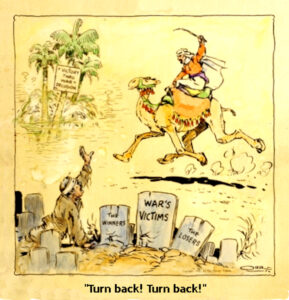
‘This war was after the First World War’, ’I asked.
‘Yes,’ said Mr. Treloar, ‘though it’s back to before this that we must go to understand the relationship between the Houses of Saud and Windsor. For a decade before this global tragedy the India Office had been ignoring requests from Faisal’s father for Britain to establish friendly relations with Riyadh. But the increase in tensions that would lead to the Great War caused Delhi and London to re-examine the safety of the links between Britain and India via the Suez Canal and the likelihood that Ottoman Turkey would side with Germany in any conflict. The British Agent in Kuwait, was dispatched to enlist the help of the Saudis in eastern and central Arabia, while T. E. Lawrence was later sent to the Hashemites in the west. Thanks to the eloquent pen of Lawrence—
‘–and the subsequent help of Peter O’Toole.’
‘—the Hashemites’ ‘Arab Revolt’ has entered popular history. Less well known is the fruitful collaboration between the Saudis and a succession of British agents which led to the elimination of Turkish influence from the peninsula, both directly and via Turkey’s client dynasty. This safeguarded the southern frontiers of what became the British mandate territories of Palestine and Transjordan. Even as British arms and money helped advance their own dynastic ambitions, the Saudis were constructive, co-operative and enthusiastic allies.
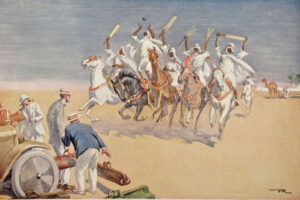
When Britain signed the Treaty of Jeddah in 1926, recognizing Saudi conquest of the holy places, there was very much a sense in which Britain had served as godmother to the new kingdom.’
‘It sponsored it’s baptism of fire with superior weaponry,’ said Russel.’ This enabled the Saudis to outgun the Turks.’
‘They had more than just firepower,’ said Mr. Treloar. ‘Their series of dazzling and politically skilful campaigns was partly conquest, partly consensus—the House of Saud are great consensus builders.
As they did with the British, so did they do deals with merchant families, the Shia minority and the tribes they conquered—sometimes with arms supplied through the deals they did with Great Britain.
But it’s true, the self image they like to promote, based on and nurtured on this experience, is the legend of the warrior prince.’
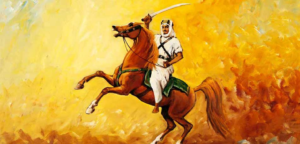
Psychologically, this ideal of the Bedouin fighter represents to the present-day Saudi what the Western cowboy folk hero represents to an American.’
‘Unsurprisingly his talisman is not a gun but a sword’, I said, ‘the traditional emblem of manhood.’
‘That’s just what his name means. Faisal or Faysal comes from the Arabic word Fa’Sa’La. It originally means that which divides, most commonly referring to that which divides between right and wrong. Thus it has become another word for ‘sword’.’ ‘Faisal’ is a noun meaning the person who breaks apart or separates matters in a decisive fashion.’
‘Yes’, I said, grimacing, ‘and can remove different parts of the human body.’
‘In the same respect it may also mean the judge who separates good from evil.
‘What impressed you about this man? Was it his piety? His discretion? His austerity? His attention to detail? His caution?’’
‘All of the above. Faisal is credited with implementing decisively a policy of modernization and reform. If his father created Saudi Arabia within its current borders, it is Faisal who has knitted it together. He is using the ‘black gold’ to turn an extremely backward, desolate desert duned society of marginal importance to the world economy into a modern state with a more influential position.’
‘He has ushered his country onto the world stage.’
‘Faisal is the perfect bridge between the old and the new because he is steeped in the traditional Bedouin world and appreciates the requirements of the modern world, in the judicious melding of past and present . He appears to be a shrewd and cautious monarch.’
‘He would have to be’, said Russel. ‘His country , dominated by opacity, suffers endemic corruption. His brother whom he replaced in a palace coup had brought discord to the government by his profligacy. He proved unable to to develop a tried and trusted bureaucracy, his continued to rely on personal advisers, and he failed to mobilize and direct for national development the massive wealth accruing to the country from oil resources. He had a massive royal residence built on the outskirts of the capital .’
‘The minute he walked in the joint you could see you he was a man of distinction. A real big spender ,’said Russel.
‘Like you at least in the first category, Russel. You knew the path you took wouldn’t lead to big personal fortune.’
‘Or heaps of children. Faisal’s alcoholic brother sired 107 children all of whom received personal attention.

To live in a shoe would not do. He housed them extravagantly and outrageously in a series of palaces.
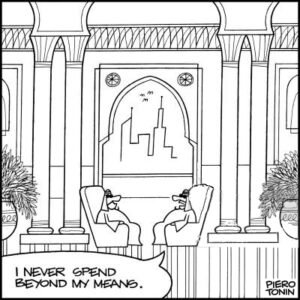
He aimed to live in the style of the Sun King with thousands of servants, guards and animals.’
‘Camelot! Camelot! I know it sounds a bit bizarre.’
‘Too much so for Faisal. He saw him more as Sin King of Sordid Arabia than Sun King.
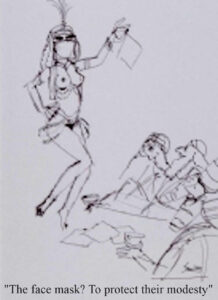
His ousting Big Daddy meant that the family will to protect and preserve the continuance of the House of Saud would emerge to replace the individual will of an ineffective king. The Kingdom’s past, present and future prospects all revolve around the dynamics of its ruling family.’
‘ Blood may be thicker than water, but oil is thicker still’, said Russel.’
‘Faisal’ lives a different style’, I said . ‘He lives simply in a modest mansion without a wall. He often drives himself to the office. He makes himself available to the public daily in the traditional majlis, followed by a meal open to anyone. Breaking bread with others, from the highest to the lowest, is important to him.
‘Guess who’s coming to dinner? asked the management of the Waldorf Astoria in New York during his visit to the U.S.
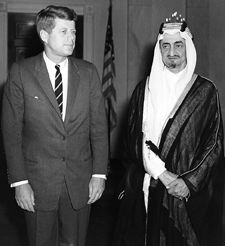
He had shocked them by insisting that one of his nubian slaves breakfast with him in the whites only Wedgewood Room.
He remembers the early days of his father’s reign when privileged classes were unknown. His father’s first palace was made of the same sun-dried mud bricks that the peasants used. Sheikhs and bedouin herdsmen called each other by their first names. Faisal was a familiar face to all throughout the realm.
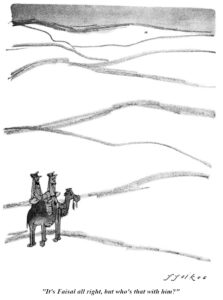
The clothing of rich and poor was quite similar. He’s happiest squatting by a desert fireplace, digging barehanded into roast goat, talking to people in their own dialect. He talks to all manner of people who drop in about his favourite topic: precious water sources in a dry landscape.’

‘I imagine the question about who gets water in the Kingdom is as potentially contentious as that about who gets petroleum in the wider world.’
‘Faisal knows the dissatisfaction and unrest that wide differences in income can create. The existence of a privileged class can be accompanied by conspicuous consumption and produce envy, resentment, promiscuous, senseless violent actions and common thievery.’
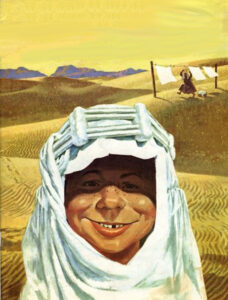
To set a example he works in his office until midnight, scarcely taking time off.’
‘Understandably. He has to strike a skilful balance between modernisation and the conservatism of a tribal and deeply religious society,’ said Mr. Treloar.’
‘‘Faisal is a man of the world, at ease in a London drawing room or a Washington conference room. He made many connections during his trips around the world as foreign minister in his father’s administration. Having been invited into the most important strategic, scientific and cultural sites in the world, he saw enough to know that Saudi Arabia could not remain isolated any longer. He aspires to create good governance composed of educated young intellectuals who have been educated outside Saudi Arabia and have no tribal affiliation, and he does not want to be dependent on the whims of the tribal leaders. Indeed, his brother’s removal from power marks a decline in the status of the traditional Saudi powers and is producing a new elite that consists more of intellectuals and senior administrative staff.
He got off on the right foot rescuing the country’s finances. His brother had embarked on a lavish program feeding the beast .Many funds had been deployed abroad. His financial policies were bringing the state to the brink of collapse. He had trapped the secretive state into a high spending mode from which Faisal had to extricate it.’
‘What has Faisal done in response?’
‘Even before he became king, with executive powers in foreign and internal affairs, including fiscal planning, he initiated an austerity program in 1959 that included a reduction of subsidies to the royal family, currency stabilization, and the resolution of embarrassing national debts. Once his hand was free, he set about cutting spending dramatically in an effort to rescue the state treasury from bankruptcy. A new word, shafafia or ‘transparency’ has entered the country’s political vocabulary.’
‘The demand to know where the money has gone,’ said Mr. Treloar.’
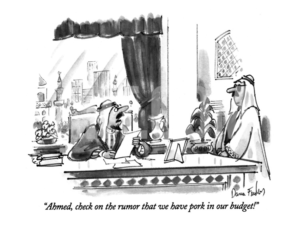 ‘This policy of financial prudence has become a hallmark of his era. It has earned him a reputation for thriftiness among the populace. His aims of balancing the country’s budget is succeeding, helped by an increase in oil production. He is asserting Saudi Arabia’s control over it’s oil resources negotiating a greater share of oil profits from the oil companies. He is investing heavily in infrastructure and laying the foundations for a modern extensive welfare state.’
‘This policy of financial prudence has become a hallmark of his era. It has earned him a reputation for thriftiness among the populace. His aims of balancing the country’s budget is succeeding, helped by an increase in oil production. He is asserting Saudi Arabia’s control over it’s oil resources negotiating a greater share of oil profits from the oil companies. He is investing heavily in infrastructure and laying the foundations for a modern extensive welfare state.’
‘So you would see him as a reforming, liberalizing, and modernizing figure,’ asked Mr. Treloar.’
‘The House of Saud sees it’s role as that of provider to it’s subjects. It plays a key role in the protection and promotion of the social and economic well-being of its citizens.’
The descriptions ‘liberal’ and ‘reformist’, must be seen in very relative terms in Saudi Arabia.’ said Russel. ‘It rules without consulting it’s people in return for loyalty and acquiescence.’
‘What about the economic planning Faisal has initiated? ’asked Mr. Treloar.
‘He has inaugurated the country’s first ‘five-year plan’ for economic development. Now could this really move the country towards the Eastern bloc?’ I asked the two academics rhetorically.
‘Hardly,’ said Russel. ‘Both Saudi Arabia and the United States share a mutual fear of the Soviet Union’s expanding global influence. Predicated on strategic and religious realities, this provides a protective political layer that envelopes oil and defence interests. We have to look at the kingdom within the global context of western post-colonial strategy and the political economy of oil. The Saudi ruler is both zealously anti-Zionist and anti-Communist, you know.’
‘Didn’t he go to the Soviet Union in the thirties?’
‘He wasn’t impressed. When a Soviet diplomat asked him why he shunned relations with the Soviet Union, Faisal replied tartly: “Go to Moscow and tell them to recognise God, and tomorrow I shall open an embassy in Moscow.”
‘He would have to wait til hell froze over,’ said Alan Treloar.
‘We hear about changes Faisal has made in education ,’said Russel. ‘What do you know about these? ’
‘He recognises the value of education as the key to ending the country’s backwardness. While he recognises the value of foreign schooling, he has issued an edict that all Saudi princes have to school their children inside the country, rather than sending them abroad. This has had the effect of making it ‘fashionable’ for upper-class families to bring their sons back to study in the Kingdom.’
‘I’m told his Turkish wife was involved.’
‘He supported her in opening the first girls’ school, despite the consternation of many conservatives in the religious establishment.
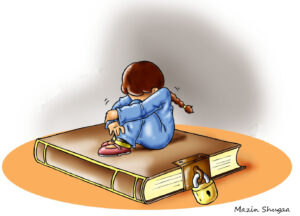
One city sent a delegation to him in protest. ’Is there one verse in the Quran that forbids teaching women to read?’ he asked them. ‘Am I forcing any of you to send your daughters to this school?’
To appease the objectors, however, he has allowed the female educational curriculum to be written and overseen by religious clerics .Faisal is confident enough to make clear that rulers rule and that the religious must go along with that. That they remain in their proper place: the junior partner, a prop to the social order, not a force to threaten it.’
‘To what extent can he lean on them?’
‘He can’t brush them aside but he has relaxed the zealous powers of the cane wielding religious police.’
‘The Commission for the Promotion of Virtue and the Prevention of Vice.’
‘Yes, such a grandiose name for ‘Thought Police’. They enforce the observance of prayer and the seclusion of women. They’re on the defensive now. People now listen to record players. Almost everyone now listens to foreign radio stations, female announcers can use film projectors at home and see photographs in newspapers and magazines.. Faisal is attempting to ensure that the most radical clerics do not hold society’s most powerful religious posts such as that of Grand Mufti. He knows from history that once religious zealots are encouraged, they can come back to haunt a country.’
‘Like those of the Auto-da-fé. When you fuel this kind of auto ,you can end up with a massive pile up of recurring nightmares. ’
‘Some haven’t been at all happy with the introduction of television, have they?’
‘A few years ago Faisal established the country’s first television station, though actual broadcasts have only begun recently. As with many of his other policies, such as his support for the pro-Israel U.S.A., the move has aroused strong objections from the religious and conservative sections of the country. He has to guard against any backlash brought about by the temptations of unimaginable riches and what are seen as foreign ways . Acting as the Custodian of Mecca and Medina, scenes of the annual Hajj pilgrimage, Faisal has assured the Salafiin, however, that Islamic principles of modesty are being strictly observed. Programs are carefully chosen though they seem to be decided by the personal whims of the morality police.
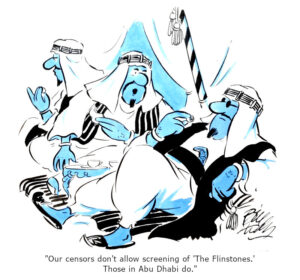
Faisal makes sure that the broadcasts contain a large amount of religious programming.’
‘Not enough for some, I’m sure. Last year, an especially zealous nephew of Faisal attacked the newly established headquarters of Saudi television but was killed by security personnel.’
‘What are Faisal’s main foreign policy themes?
‘Pan-Islamism, anti-Communism and pro-Palestinian nationalism.’
‘He’s accused by the U.S. Israel lobby of being anti-semitic. They organized rallies to jeer and heckle him in New York.’
‘How can he can he be anti-semitic? Aren’t the Jews and Arabs both considered semitic?’
‘Arabs are also a semitic people. For most of the past fourteen hundred years Arabs have not been antisemitic as the word is used in the West. Most Arabs are not Christians brought up on stories of Jewish deicide. This long-held common belief in Christianity lays the responsibility for the death of Jesus on the Jewish people as a whole.’
‘It’s always mischievous and irresponsible to lay responsibility for the death of anyone on another people as a whole. To paint a whole group with the same brush.’
‘Yes and let’s not forget Christ was condemned by the Roman governor, not by jews. It was the colonial head who denied Jesus was a God. That’s why in Islam, such stories are rejected by the Qur’an as a blasphemous absurdity. Throughout most of this time, provided they did not contest the inferior social and legal status imposed on them, jews in the arab world were provided relative security against persecution and welfare —a protection that was missing for non-Christians in most of Europe.’
‘How long did this situation go on there?’
‘Until the French Revolution. This brought about institutionalization of equality under a secular idea of citizenship .This allowed the jews to enjoy their respective religious laws and ways of life.’
‘These are the freedoms Faisal said he upheld at a luncheon tendered in his honor by the Washington press corps last year. Defending the Arab boycott of U.S. firms trading with Israel he asserted that “it has never been our aim to exterminate Israel and throw it into the sea.” He then gave his interpretation of Israel’s emergence. He said that Jews were always recognized as co-citizens of Arabs in Palestine, but “Zionist aggression occupied the country and threw out the Arab people.
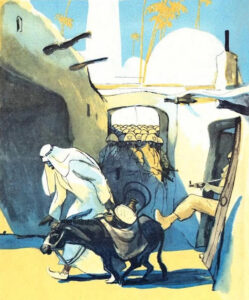
Many became refugees. Jews from outside came into the country. Jews from outside are aliens.
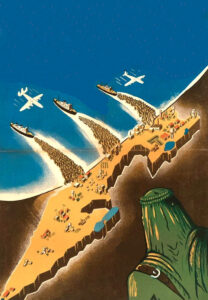
By aggression they have taken over the land.” The King said “the Jews” had been guilty of “violation of every human right” of the Arabs. He said the Jews had denied the Arabs “the right of a person to his own home.”
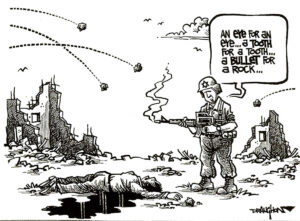
He said at another point that Saudi Arabia had “no aggressive intentions against any country or any religion.”
‘He makes the strong case that survivors of the Holocaust should have been given the choicest land in Germany and places in Europe from where they were themselves dispossessed. He argues that recompense for a crime should be made by the criminal, not by innocent bystanders.’
‘What rights do Communists have in Saudi Arabia?’
‘Under no circumstances are they permitted to organize and operate. Faisal is an authoritarian who suspects an unholy alliance between Zionism and Communism.’
‘That sounds hard to believe,’ I said, ‘ relations between Moscow and Tel Aviv couldn’t be worse .’
‘Some people believe in all kinds of conspiracies.’
One thing’s for sure. The relationship between Saudi Arabia and the U.S. is very close. Faisal declared in 1962, ‘After Allah, we trust the United States. ’
‘According to the Quincy Pact, arrived at by Faisal’s father and Roosevelt,
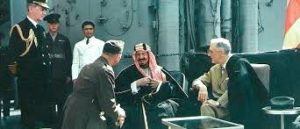
the US obligates itself to protect the kingdom and the Saudi royal family in exchange for furnishing oil on privileged terms.
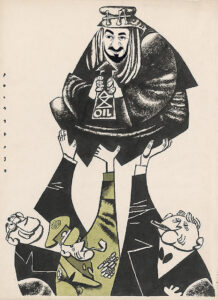
A tacit clause of this pact was Roosevelt’s promise not to allow the creation of an independent Jewish state in Palestine.
In the closing days of the war, Roosevelt confirmed in writing to Faisal’s father his promise to not take, as chief executive leader of the government, “any action, that might be construed as hostile to the Arab peoples. Faisal was assured the same thing by Truman’s Secretary of State, George Marshall.”
‘The establishment of the state of Israel and the dispossession of the Palestinians would have flown in the face of this.’
‘After the death of Roosevelt, Faisal felt completely betrayed because President Truman, basically for reasons of election convenience and advantage, declared his support for the partition of Palestine. In fact Truman recognized the state of Israel fifteen minutes after it’s proclamation.’
‘What did the U.N. have to say about this?’
‘On the subject of voting on the partition, the General Assembly voted twice,some say to get the desired result. Faisal publicly denounced this as manoeuvres of subornation and intimidation. He declared that for these reasons his government ‘does not recognize the resolution adopted by it’.He continued to use his influence to promote the Palestinian cause to the governing circles in the US.’
‘He did this forcefully as a counterweight to his fidelity to the US. To be seen as independent of it by Saudi Arabia’s neighbours.’
‘The U.S. has historically tried to back both Israel and the conservative arab states.’
‘A bob each way.’
‘Exactly, and this ambiguous policy, the original sin for what we witness today, has been remarkably successful.’
‘‘Especially for the arms dealers whose build up in trade weighs down any peace initiatives.’

Do you think Nixon and Kissinger will continue the US commitment to arming both sides?’ I asked Russel.
‘Nixon has stated most categorically he will expand even further this central plank of its Middle East policy.’
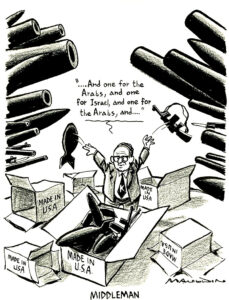
‘At times the U.S. makes pro Arab gestures, fully aware the Arab states are too watery to challenge it’s pro-Israel tendency,’ said Alan Treloar. ‘Their leaders grumble about the US taking sides, regarding Israel’s arsenal as legitimate self-defence, as Faisal noted, and the same weapons in Arab hands as a threat to the civilized world.
‘Faisal knows not to rock this boat too much. If he were to threaten any oil squeeze against the advanced capitalist economies, he would be be reminded that to weaken the West is to strengthen Communism. He would face the the threat of the U.S. wanting to occupy Saudi oil fields.’
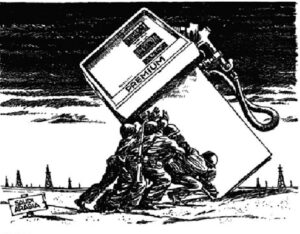
The oil embargo of 1973, in response to Western support for Israel, would highlight Saudi Arabia’s economic and political influence. In that year the US would threaten to bomb Saudis oil fields after King Faisal cut off their supply for supporting Israel. King Faisal told them, “You’re the ones who can’t live without oil. We come from the desert, our ancestors lived on dates and milk, we can go back and live like that again.”
‘By withdrawing Saudi oil from the world markets, Faisal would go on to trigger the oil crisis leading to a massive spike in the price of oil and market chaos.
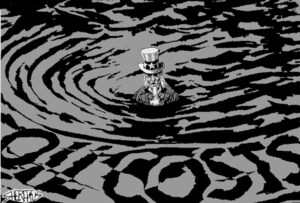
The Saudis would have the West over a barrel.
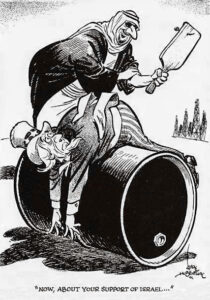
Providing himself with a respite from the onslaught of bad press at home due to the infamous Watergate scandal ,Nixon visited the kingdom to strengthen U.S. relations and to convince the King not to up the price of oil.
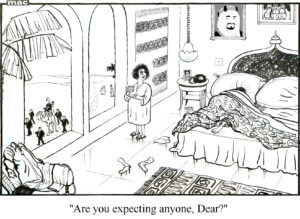
Neither he nor Kissinger would be able to influence him otherwise.
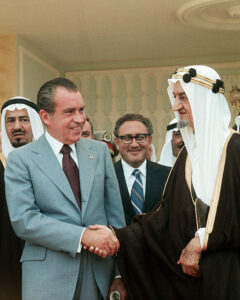
Nor would Colonel Gaddafi, relishing the situation, want to.
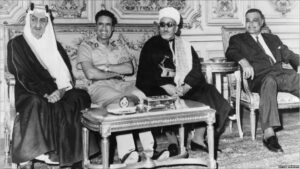
The price of oil per barrel would soar.
‘Yamani or your life!’ would become the order of the day.
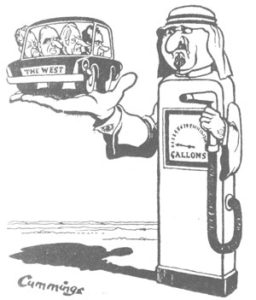
In the game of economic strip poker the average consumer would lose assets due to skyrocketing costs for utilities and commodities. It would be a cold winter for them.
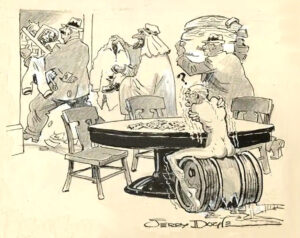
‘And the U.S. has to work hard to placate him, I said.’
‘For their part the U.S. fears any coup in a domestic backlash against Faisal would deal a crippling blow to their economy. It is frightened of such a prospect. The U.S. is happy for the arms delivered to be used against militant nationalist and republican forces throughout the region as long as they’re not used against Israel, or at least sparingly.’
‘How are relations with the neighbouring more populous states? Do the bonds of background trump those of inter-regional rivalry ? The difference in living standards between The Saudis and their Arab neighbours could always tip over into an explosive regional imbalance. Things are rocky regarding Saudi-Egyptian relations, I believe. ’
‘The Muslim world is as as diverse in its political, social and religious traditions as the Western one. Trade, military advantage, and inter-ethnic rivalry play just as important a role as any idea of a unified Islam acting in concert.’
‘That which Faisal urges.’
Yes. While the Arab world is divided into different states, there exists among all classes consciousness of a common Arab identity and a desire for unity. Hence Faisal’s collaboration with such odd bedfellows as Nasser and Yasser Arafat.’
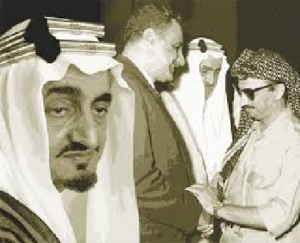
‘Faisal is the proverbial ‘man behind the curtain,’ the guy who exerts power, wields influence, and manipulates events but seeks to remain largely anonymous.Nasser and Arafat are pursuing a more more vocal secular approach.’
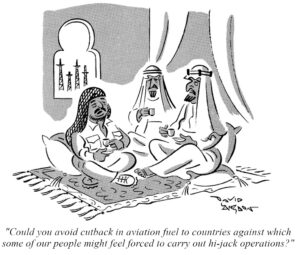
‘’The three are drawn together because of their mutual stakeholders interest in obtaining Arab independence from non-Arab foreign intervention, ’I suggested.
‘Beyond that point all similarity of objectives vanishes. The Egyptians and P.L.O. receive Soviet backing.’
‘Khruschev lent financial assistance to Egypt for the construction of the Aswan Dam. Britain refused to do so likewise at the behest of the U.S. and the Kingdom. They feared Nasser would open the floodgates to Soviet involvement in the region.’
‘ This has had a great flow-on effect. It has placed great pressure on Britain. To reassure their Saudi client Alec Douglas-Home found himself having to swim upstream.’
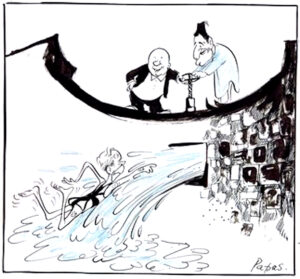
‘The kingdom fears republican thinking will spill over onto the peninsula. It faces a serious challenge from the popular, besuited Egyptian leader. He deposed his own king, seems bent on dominating the Arabian peninsula and bringing Faisal into his fold.
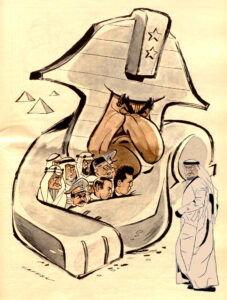
Saudi officials were aghast when Syria and Egypt merged in 1958 to form the United Arab Republic.
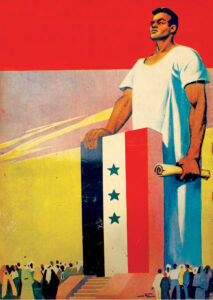
In the on/off relationship between Riyadh and Cairo, Nasser’s reputed to have stated ‘To liberate all Jerusalem, the Arab people must first liberate Riyadh’.
‘Big Daddy is reputed as having tried to assassinate Nasser.’
‘With friends and family like these, who needs enemies? Faisal is still engaged in a proxy war with Egypt in Yemen. Just five years ago nine Saudi air force officers defected to the Nasserites, with the U.S. sending in planes to fill the gap. Faisal has exploited border skirmishes with the Egyptian military, referring to them as agents of Communist aggression. You can imagine how well this has gone down in Washington with leaders across the Persian Gulf, bankers and backers scurrying to it for protection.
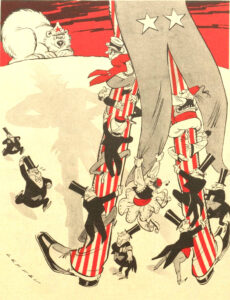
A more virulent American foreign outlook is taking place since the full scale entry of troops into Vietnam.’
‘Isn’t Nasser also fervently anti-Communist?’
‘He is but he’s fraught with dilemmas., He threw his lot in with the Soviet Union as the CIA were continually trying to undermine him. His tilt against imperialism is mostly rhetorical. His bark is worse than his bite. Nasser is trying to reach some agreement with the King. In spite of their differences the common language and heritage demand that all the Arab states engage in limited economic and political co-operation. Saudi aid can be deployed to stabilize whichever regime requires it. The Saudis bank reserves and develop services in Egypt and Lebanon.’
‘And fund the Palestinian cause, fighting the U.S.’s other close ally in the region.’
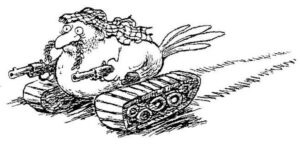
‘The Israelis beat up and kill the Palestinians and the Saudis patch them up and bury them.’
How sincere is this expression of a shared Arab bond really?’
‘ Like all the Arab regimes, the trio you’ve mentioned invoke this mystified and classless conception of a common ‘Arabism’ to their advantage. At the Washington press corps luncheon Faisal bristled when a reporter asked whether Saudi Arabia considered Egypt or Israel a greater enemy. He replied: “I regret deeply this question. It is based on a premise very much contrary to truth.” He described Egypt as a “sister country” and the Egyptians as “our brethren.” He stressed that, despite differences between Saudi Arabians and Egyptians, “they remain our brethren.”
‘You’re suggesting that he’s manipulating the popular sense of unity in order to reinforce his own position.’
‘ And thereby that of the Western powers.’
‘By posing as the champions of a classless Arabism,’ said Russel, ‘those Arab leaders are able to deflect criticism from the oppressed within their own country. Their regimes manipulate the Palestinian question to ensure class collaboration within their own states. The Saudi position on Israel is dominated more by religious obsession about the ‘Islamic’ character of Jerusalem than by solidarity with the Palestinian people.’
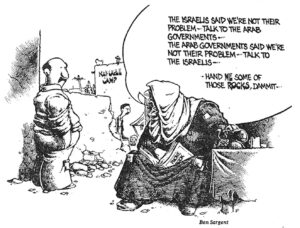
‘Whose P.L.O. leadership includes members of different belief systems.’
‘ Their fellow Arab leaders have proved incapable of assisting the Palestinian people to assert their self-determination. In this way the predominance of a national rather than a class conception contributes to the strength of imperialism throughout the area and to the disunity of the Arab world.’
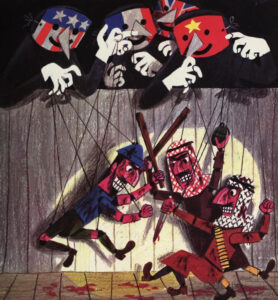
I discussed the hurricane movement of the Six Day war that came the following week with Mr. Treloar.
‘Relations between Israel and its neighbours’, he said , have never fully normalized following the 1948 Arab–Israeli War. All the attendant tensions have became dangerously heightened. They now have to be resolved on the battle field.
Despite the country’s alliance with America, it’s powerful foreign protector, Faisal is providing logistics and helping payroll it.’
After the short war we discussed it’s consequences.
‘A week is a long time in politics.’
‘Nasser’s defeat and a weakened Egypt has changed the political landscape.’
‘Any disputes between Arab states must now have to take a secondary position to what the Arabs call the ‘alien threat’ of Israel. It has seized and retains Jerusalem, the third holiest city of Islam.’
‘This is indeed a game changer. Any sense of completely secular Arab states may have ended. Saudi Arabia’s power in the region has been further enhanced.’
‘In what ways?’
‘It sees itself as guarantor of stability in the Middle East. Egypt desperately needs Saudi money to rebuild it’s military so must now come cap in hand to Riyadh. Faisal is now the predominant Arab leader and the moderator of Arab disputes. He is the one ready to use oil wealth to play on the centrality of Islamic practice, redefine the kingdom in Islamic terms and promote his idea of global Islamic solidarity.’
‘And also to buttress it’s political bargaining power with the recipients and the West.
‘So what’s on the cards now the genie’s out of the jerrycan?’
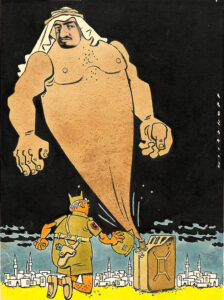
‘What we see happening today in the Middle East is a direct result of Western opposition to Nasser’s strategies and ideals. Saudi Arabia is set to play a more aggressive role in the Middle East.
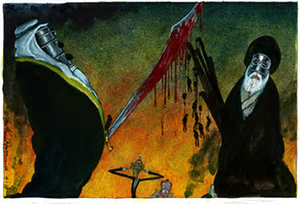
Both monarchism and Islamism will profit from the failure of the secular nationalist project. The ideological field is now wide open for proselytising competing versions of a central notion: that Muslims should not merely show solidarity with one another but go to each other’s aid when they are under attack, to capture the imagination of the Arab world.’
‘So who will define what the attacks are? Some shrill cleric with a reliance on religious references or an enlightened despot backed by his educated populace ? And what about when Muslims go for other Muslims?’ Isn’t this just as likely as nominally Christian states or their citizens attacking one another?’
‘ All citizens should show solidarity with all others irrespective of beliefs. They should all go to each other’s aid when under attack. They have to be educated as to where any real potential attack could be coming from.’
‘What role can we expect now in the military sphere, Mr. Treloar?’
‘Faisal and the U.S. are building up Saudi Arabia into a massive military capable of not only crushing any internal threat but of intervening throughout the neighbouring states. The kingdom relied on Britain and the U.S. to set up it’s air force and navy and will continue this build up.
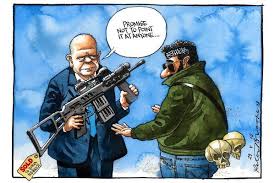
As a counterbalance to any potential regional Baathist upstarts, The U.S. provides the material guidelines and the Koran the ideological justification.’
The irony would be that it was this narrow interpretation that would scare the hell out of the House of Saud itself. For years it looked leftwards politically towards communists, constitutionalists, liberals, as the potential source of trouble. And what was clearly the coming threat to regimes in the Middle East, was that from the religious side of things. To bolster it’s legitimacy the House would pump a motza into the clerical class. It’s rise would prove to be simultaneously a pillar of support and a potential threat. The unfortunate consequence of this arrangement would be the de facto encouragement of extreme figures at the expense of more reasoned voices.
In the Saudi Arabian tradition of violent religious extremism that resurfaces almost every generation, a portent of the future, Faisal was slain by a nephew following a family dispute over the propriety of introducing television to Riyadh. While trying to edge the Kingdom into modernization at the same time as retaining traditional values, he eventually paid with his life for his efforts. It is said by his Islamic admirers that on his death bed he asked the life of his assassin be spared. This rejection of capital punishment is in line with that of the Catholic Church and others. It is one to be held to by all.
Pan-Islamism, the core of Faisal’s foreign policy, would lie at at the core of global jihad. The idea would gain a further boost in the anti-Soviet war in Afghanistan in the 1980s. But after the celebrated Soviet defeat and withdrawal in 1989, it became clear that pan-Islamism was a Pandora’s box from which unintended consequences would emerge, including Al-Qaeda and related salafist calaphists. The country’s roiling disaffection with the stationing of foreign troops and economic downturn would produce sixteen of the nineteen 9/11 hijackers, dreaming of messianic purity, proudly resisting the march of history, and sacrificing themselves and others to what they saw as a higher cause. The mental Mobius strip they caused dictated that only the most extreme violence can lead to purity, the opposite of violence, a position that is, of course, impossible to wrap your head around. Like soldiers of the Third Reich, who had it inscribed on their belt buckles, they too believed they had God with them. They and their followers believe they do what was and is expected of them. Saudis had a determining hand in the terror strikes, supplying the transmission belts to fanatical organizations.
The attacks and those that followed would have absolutely nothing to do with protecting the sanctity of Islam. As would the blind, wild lashing out by The House of Bush be nothing to do with protecting democracy and the sanctity of human life .
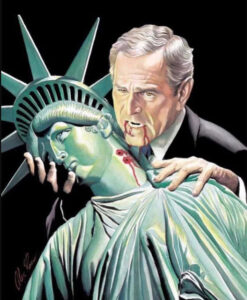
The Bush boys had seen what was inside the box too.
Continuing to discount Faisal’s pleas for the Palestinian cause, the threat from Muslim ‘jihadists’ and their WMD totin’ terrerists [sic] would become for the U.S the catchall answer to demands for peace.
For Faisal’s successors, disregarding his warnings against sectarianism and racism, the “Shia threat” would become their catchall answer to demands for democratic reform and accountability, together with Uncle Sam replacing the Communist bogey with the new simple ‘Terrorist’ model.
It’s very convenient for governments. to encourage culture wars than allow critics to direct their ire toward the seat of power.
The marriage with the U.S. would prove fatally contradictory. American funding of jihadists in Afghanistan in the 80s, an alliance with the House of Saud, and visceral support for Israel at the expense of Arabs would provoke more death and destruction in the mainland United States than forty five years of cold war.

The extent of this contradiction would have to be seen to be believed with the election of Donald Trump. As a presidential candidate, he would spend much of the election campaign needling, critiquing, denouncing, and even threatening the Kingdom of Saudi Arabia. He would blast the Saudi royals for being freeloaders and threaten them with an economic boycott. He would claim that, without U.S. support and protection, “Saudi Arabia wouldn’t exist for very long.” The real problem, he would go on was that the Saudis are “a money machine … and yet they don’t reimburse us the way we should be reimbursed.” Asked if he would be willing to “stop buying oil from the Saudis” if they refused to pull their weight, Trump responded: “Oh yeah, sure. I would do that.”
He would slam the Saudi government for executing homosexuals, for ‘ pushing gays off buildings and treating women ‘horribly.’
Twice in a single day, he would accuse Saudi Arabia of being behind the 9/11 attacks.
In response the fawning Saudi government would offer a warm and lavish welcome to a president who said ‘Islam hates us’ and wanted to ban all of the world’s 1.6 billion Muslims from entering the United States.
The Saudi position on the latest iteration of the Trump travel ban, targeted at 170 million-odd Muslims? A “sovereign” decision aimed, apparently, at “preventing terrorists from entering the United States of America” and made by a “true friend of Muslims.”
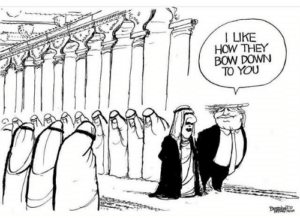
It would offer a platform to the world’s most famous Islamophobe, to give a speech on Islam in “the birthplace” of Islam. To single out Iran as a state sponsor of terrorism. and call on all, quote, ‘nations of conscience’ to isolate it.
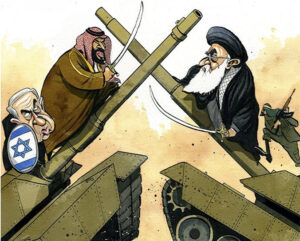
Like the American conman, his hosts understand the popularity that comes from promoting a combination of religion and nationalism. They know this appeals to a constituency who fear that different social groups and changing social mores will lead to an overthrow of their dominance.
The Kingdom’s unique blending of worldly wealth and religious resources, the clash between the materialism that the east coast generates and the spiritual traditions of the holy cities in the west, would lead to a classic conflict between God and Mammon, ancient and modern. The puritan state would be strained to breaking point.
There would be no dearth of critics both within the Kingdom and across the Red Sea to point up the shortcomings of an antiquated Bedouin monarchy awash in money and self-indulgence.

I learned of Mr. Treloar’s acquaintance with Moshe Dayan and time spent in Egypt.